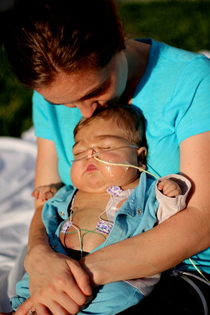 When your child has a chronic health condition that threatens his life and well-being, you gain a sharp perspective on what's important in life. You live fully, deeply, in the moment. You understand that there's nothing more important than the health of your family. You would go to great lengths to protect your family's health and would do anything to save your child from hurting.
When your child has a chronic health condition that threatens his life and well-being, you gain a sharp perspective on what's important in life. You live fully, deeply, in the moment. You understand that there's nothing more important than the health of your family. You would go to great lengths to protect your family's health and would do anything to save your child from hurting.
Some threats to our family's health are obvious, like drugs and alcohol, poor diets and inactivity and risky behaviors. Most of us can appreciate the obvious risks posed by pesticides, harsh cleansers, and poor air or water quality. But, there are thousands of toxic chemicals that can threaten our health every day that we can't see or smell and that we are exposed to without our consent or knowledge. Often, we are led to believe these exposures are safe and benign.
Chemicals like heavy metals (lead, mercury, and arsenic), plasticizers, toxic flame retardants, and formaldehyde are found in everyday products throughout our home, schools, and workplaces. Our furniture, home improvement items, children's products, and cosmetics often contain chemicals linked to neurodevelopmental disorders, endocrine disruption and cancer.
These hidden chemicals are anything but benign.
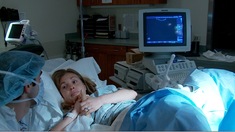 "The Human Experiment," a documentary film executive produced and narrated by Sean Penn, features my family's health struggles. The film delves into the toxic chemicals in everyday products and their link to common health conditions like infertility, cancer, developmental disorders and adverse pregnancy outcomes.
"The Human Experiment," a documentary film executive produced and narrated by Sean Penn, features my family's health struggles. The film delves into the toxic chemicals in everyday products and their link to common health conditions like infertility, cancer, developmental disorders and adverse pregnancy outcomes.
"The Human Experiment" teamed up with clinicians, scientists and environmental health experts with the hope of bringing this obscure issue into mainstream conversations. And it's working. "The Human Experiment" is screening in film festivals around the world, igniting activism and giving hope to families concerned about the health impacts of toxic chemicals. Check out the trailer and stay connected to learn when the film is coming to your hometown.
Now, let's get to The Lab... also known as your life. As we interact with the materials and products that fill our lives, we become subjects in an uncontrolled experiment. Let's investigate those five unexpected places laden with toxic chemicals.
Dust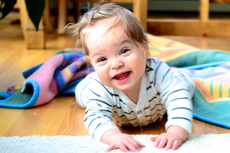
Solutions:
•Use a wet rag to prevent dust build up
•Vacuum regularly
•Support companies that don't use toxic chemicals in their products
•Learn more: www.HealthyChild.org
Personal Care Products
The products that we use on our bodies are often loaded with concerning chemicals. Heavy metals, formaldehyde, phthalates and synthetic fragrances are just some of the common chemicals in personal care products. Some manufacturers even add synthetic fragrances (listed as "fragrance" or "parum") to baby diapers, feminine care products and toothpastes!
Solutions:
•Ditch all forms of synthetic fragrances
•Rely on non-toxic, biodegradable products
•Use less stuff on your body and in your home
•Learn more: www.SafeCosmetics.org
Food Packaging and Cookware
Styrofoam and certain types of plastic containers, non-stick cookware and canned foods all rely on chemicals with the potential to disrupt health. 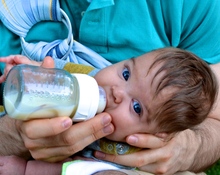 Some critics say that the levels of exposure to harmful chemicals from our food packaging and cookware are too low to cause concern. Yet, this "low dose" argument falls flat when we consider that we are exposed to many toxic chemicals from many products every day. Some of us are more vulnerable to the effects of these chemicals, including developing babies, particularly during critical times of development.
Some critics say that the levels of exposure to harmful chemicals from our food packaging and cookware are too low to cause concern. Yet, this "low dose" argument falls flat when we consider that we are exposed to many toxic chemicals from many products every day. Some of us are more vulnerable to the effects of these chemicals, including developing babies, particularly during critical times of development.
Solutions:
•Ditch plastic whenever possible
•Rely on cast iron, stainless steel, glass and wood in the kitchen
•Eat whole, unprocessed foods as often as possible
•Learn more: www.SaferChemicals.org
Medical Equipment 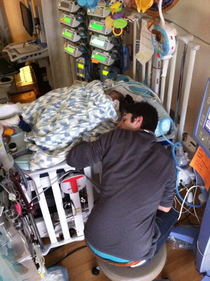 I have a deep understanding of and appreciation for the life-saving powers of medical equipment. Less toxic options are desperately needed, especially for our pediatric patients. Carcinogens and endocrine disruptors have no place in devices intended for healing. It's challenging to nurture our bodies back to health when we rely on products made with toxic chemicals, including polyvinyl chloride and phthalates.
I have a deep understanding of and appreciation for the life-saving powers of medical equipment. Less toxic options are desperately needed, especially for our pediatric patients. Carcinogens and endocrine disruptors have no place in devices intended for healing. It's challenging to nurture our bodies back to health when we rely on products made with toxic chemicals, including polyvinyl chloride and phthalates.
Solutions:
•Hospital patients, especially infants, young children and women of child-bearing age, should ask for PVC-free and DEHP-free alternatives to medical equipment, like IV bags and tubing. These alternatives are not available in every hospital, but it's always beneficial to ask.
•Medical equipment is often urgently and critically needed. The benefits of necessary life-saving medical equipment far outweigh the risks of exposure to chemicals of concern from these products.
•Learn more: www.NoHarm.org
Your Body
Biomonitoring (the measurement of toxic chemicals in our bodies) has demonstrated that virtually all of us have industrial chemicals streaming through our body and stored deep in our fat tissue. Toxic, industrial chemicals are even found in newborn infants, who are exposed in-utero. These chemicals were never intended to adulterate our bodies, but indeed they are. Our life is industry's lab; it's "The Human Experiment."
Solutions:
•Get informed
•Reduce your exposure
•Share what you know
•Learn more: www.EWG.org
It's easy to take our health for granted. But, once it's jeopardized, the fragility and importance of our health becomes immediately apparent. Health-affected families can be incredibly insightful on health issues because they understand that the core strategy must be prevention. If we can protect our health now, we can help to reduce our family's risks of preventable diseases in years to come.
Opt out of "The Human Experiment." Let industry know that your life is not their lab. If we all make small changes, and demand safer, healthier options for our families, we can reverse the high costs of The Human Experiment.